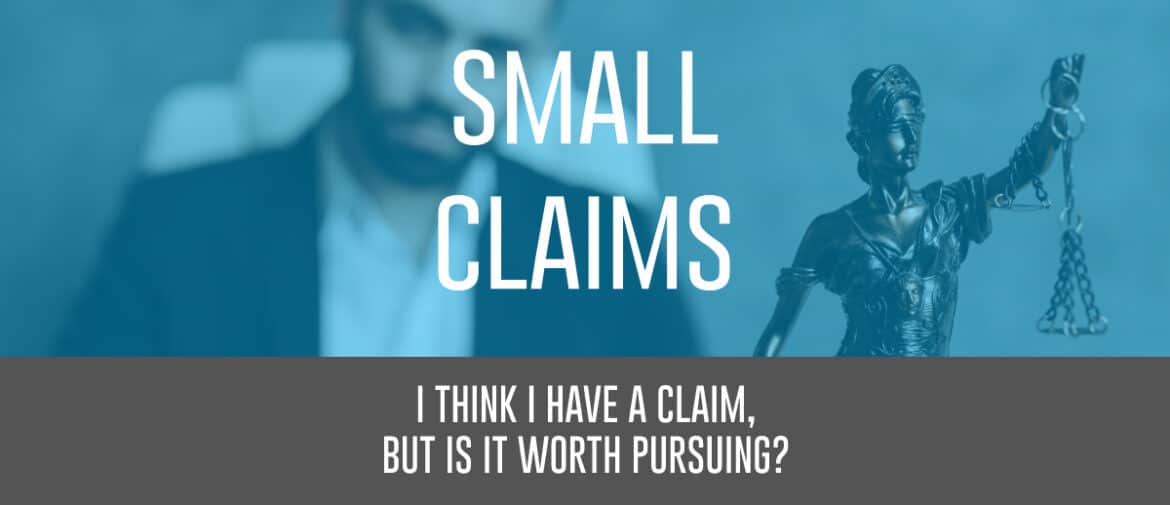To preface this blog, I remind you this blog does not constitute legal advice, nor should you treat it as such. Each case is different and you should not rely upon my commentary below to make an important decision about your case.
My aim is to provide you with some reasons why you should consider proceeding with your small claims action when you are simply worried about the cost and the (perceived) added stress from litigation.
The small claims procedure is available only for monetary claims between $5,000 and $35,000.
Below $5,000, you typically advance your claim through the Civil Resolution Tribunal (CRT).
Above $35,000, you either waive the additional amount you're seeking, or file your claim with the Supreme Court of British Columbia.
I will not delve into the intricacies and exceptions that apply, but you should know there are certain matters (like defamation and disputes arising from purchase and sale of land,) which our small claims court has no jurisdiction for, even if the claim is for under $35,000.
For many clients, choosing the small claims route is by far the most practical option.
1) Easier Requirement of Service
Compared to the procedure required to begin and advance a Supreme Court claim, in small claims your job as a litigant is much simpler.
Once you file your claim with the court registry, you are only required to serve the claim to the defendant via registered mail.
At the Supreme Court level, the method of service required is personal service, which often involves hiring a professional process server or having a family friend deliver the document(s) to the defendant in person.
That higher requirement is indicative of the comparative formality of Supreme court claims, and the need to actually inform the defendant of the case made against him or her.
In comparison, the small claims process begins by filing the claim and sending it off via registered mail. The simple procedure and lower expense is hardly an obstacle to commencing an action.
2) Effectiveness of the mandatory Settlement Conference
The entire small claims procedure is geared towards trying to resolve your claim. Perhaps the most critical and distinctive step is the mandatory settlement conference (*for certain types of matters, the conference is not mandatory).
As the name suggests, this is where a Provincial Court judge encourages the parties to settle the case, there and then, without having to get to trial.
The parties are asked to frankly disclose their position and any relevant pieces of documentation. Everything said and communicated during the conference is confidential and cannot be disclosed or used by the other party after the conference.
The result is often an honest, interest-based communication between the parties, where the word of the judge effectively sways the parties to compromise their position and reach middle ground (though where that middle ground is will depend on the strength of your case).
A judge's non-binding opinion of the strengths and weaknesses of a party's position is invaluable and particularly effective at achieving early resolution.
3) Cost
We see above that the streamlined nature of the small claims procedure helps to resolve your case in a very efficient manner.
The time to prepare for trial and the stress involved in preparing the evidence, in the manner required, may be too much for the ordinary person who has a busy life or a business. At the same time, this is why carefully planning and drafting your Notice of Claim in the beginning is so vital.
Getting legal assistance to draft your claim ensures your claim is presented professionally and based on valid legal grounds. In my experience, the simple clarity with which your claim is presented can win over the judge and helps him/her to understand the issues, often in your light.
From the defendant's perspective, a carefully drafted claim sets the tone for negotiation at the conference, which is invaluable.
Conclusion
If you are pondering whether to go through Small Claims BC and are still hesitant about pursuing "litigation", hopefully the points made in this post are helpful.
If you have questions regarding your case, please consult a litigation lawyer who regularly deals with small claims matters. Please call us at (778) 565-4700 for an initial consultation.
About the author
Simon practices in the areas of employment law and litigation, including small claims litigation. He has represented clients in commercial litigation matters such as commercial lease disputes, and breach of contract cases. In addition to court proceedings, Simon has experience assisting clients in arbitration proceedings and negotiating settlement agreements. Learn more about Simon.
The preceding content is for informational purposes only and does not constitute legal or professional advice. To obtain such advice, please contact our offices directly.

